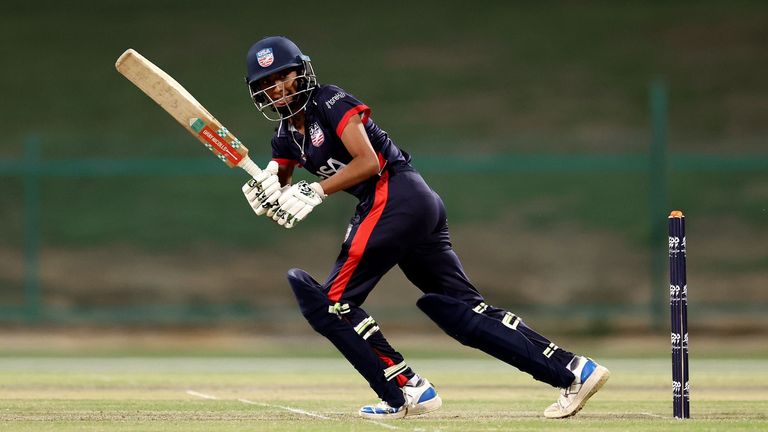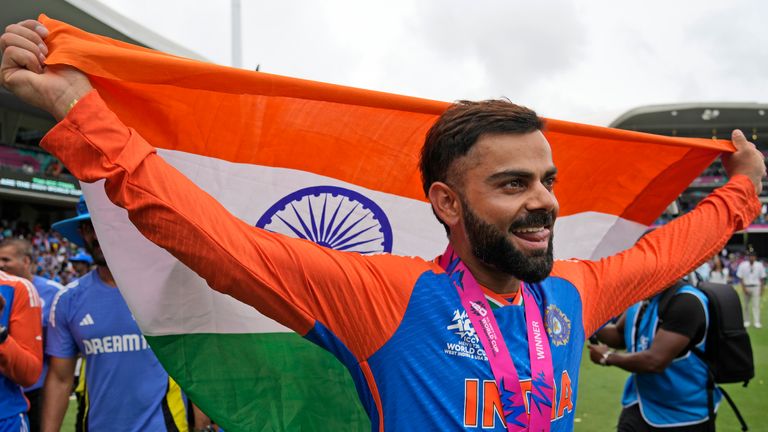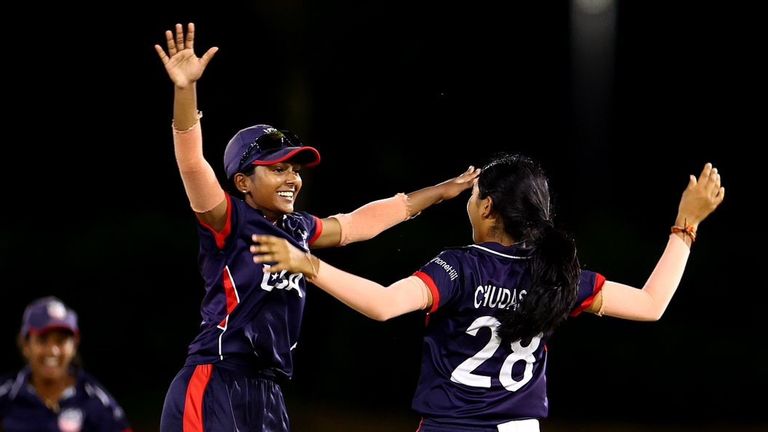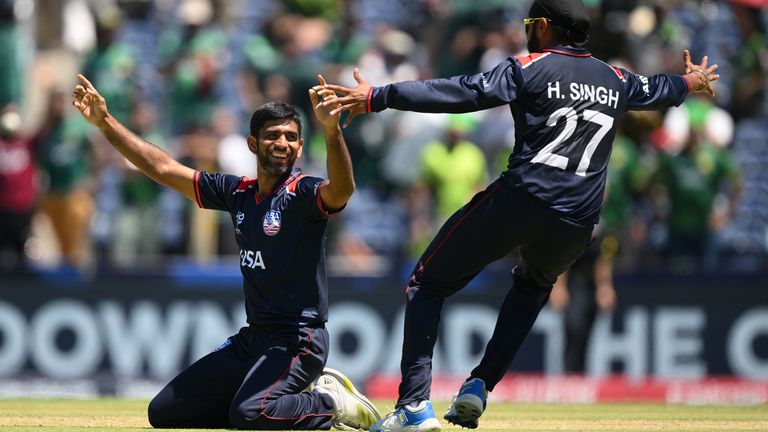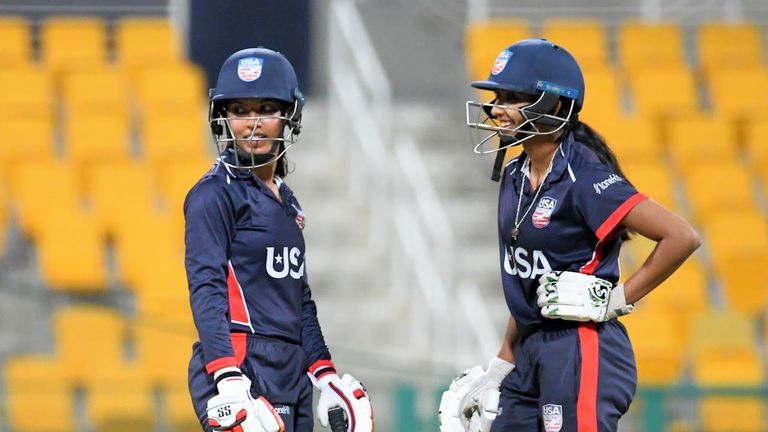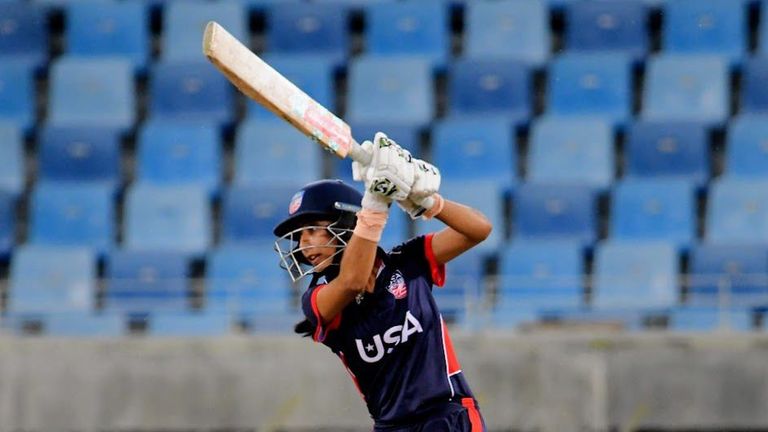[ad_1]
When the United States of America released their Under-19s team for the ICC World Cup in South Africa last year, the teenagers encountered a tirade of social media abuse.
Why?
Because the team was predominantly South Asian.
“I remember there were comments that said: ‘This isn’t an American team, this is an Indian team,” said Aditi Chudasama, who was 16 years old at the time.
“I was born here and I’ve grown up here.
“It was the first time I had experienced something like that on a big platform. People can just say hateful things about you.
“I was very young and I didn’t know how to respond to it.”
A recent report commissioned by the International Olympic Committee (IOC), found that social media abuse aimed at athletes had risen considerably in recent years, with up to one-third of posts now containing negative content targeted towards sporting stars.
“It didn’t take me long to realise this is something out of my control. My job is to play cricket and that’s where my focus needs to be,” Chudasama continued.
“I need to focus on what I can do for the team to get the job done. I don’t pay attention to it anymore and we’re kind of used to it.
“I think we’re all taking it in great spirits.”
It’s unsurprising that Chudasama’s love for cricket began with her family, a sporting lineage common amongst many.
“I think cricket was introduced to me because I’m South Asian,” she says.
But playing the sport as a female in an associate nation came with its own challenges. She had to join a boys league because of the lack of popularity and reflects on the experience positively saying it “toughened her up.”
It also meant Chudasama had to look to her second team, India, for role models – a country where cricket is considered like a religion and talent is aplenty.
Among her idols are Mithali Raj, Virat Kohli, Ravindra Jadeja and Rohit Sharma.
“I had tears in my eyes when I found out Kohli was retiring,” Chudasama said.
“I’ve always admired his attitude. When I would watch him as a kid I saw the way he carried himself, particularly in rough times, and it was so admirable.
“You learn a lot of lessons from that, how to get through good things and bad things. He’s carried Indian cricket for a long time and I look up to that.”
Kohli led the Indian U19s team to World Cup glory in 2008, when Chudasama was just two years old.
Now, 16 years later, the former has retired from the T20 format at the precipice of the sport after winning the World Cup, while the latter has just started the trek, and with another U19s World Cup around the corner taking place in Malaysia in January 2025, off-spinner Chudasama has big dreams.
‘American first and Indian second’
Supporting two teams is a dichotomy the South Asian diaspora are familiar with and while Chudasama supports India, it’s the USA who will always come first.
“I’ve learned everything about the sport from the United States and however far I go, I think it’s my responsibility to give it back.
“I have pride in my country and when we were watching the T20 World Cup, we were supporting the USA, stripes and stars all the way.
“Obviously, India is my home country and that’s one of the challenges of having two sides.
“America is a very diverse country. We have people from everywhere in the world and South Asian countries are very cricket-dominated, so it wasn’t a surprise the USA squad had a lot of Indians in it.
“It’s strange that some people don’t see us as American, we’re all born here, but I try not to give it too much time or attention.
“We’re American first and Indian second.”
The American-Indian dream
The USA men’s team pulled off one of the biggest shocks in cricket history when they beat Pakistan in a pulsating super over in Dallas at the T20 World Cup in June.
It was a seismic victory that shot the associate nation into the limelight, namely the Silicon Valley fast-bowler, Saurabh Netravalkar, who attracted attention after fans found out he plays cricket part-time and his day job is a software engineer at tech company Oracle.
Behind the scenes, the victory also accelerated interest in the women’s game.
“Women’s cricket in the States is growing very, very fast. We have a lot of young talent and they’re very good,” added Chudasama.
“It can only get better from here and it’s just so exciting to see where we can go.
“When I started playing, we only had enough players to form two teams. Now, so many girls are involved and the domestic structure is building towards something that will help too.
“Even at games, we have more support now. Little girls tell us they started to play cricket when they saw us.
“It’s overwhelming to think about. I saw cricket as a sport that unified people and now I’m playing a role in that, it’s a great feeling.”
Cricket is set to return to the Olympics at the Los Angeles Games in 2028. The sport was part of the 1900 Olympics in Paris with only two teams – Great Britain and France – competing for medals.
For Chudasama, this is the ultimate dream.
“It’s something we’re already thinking about. Obviously, our first priority is the World Cup and to make an impact there, but the Olympics will be huge,” she said.
“Even just the opportunity to participate is amazing, it’s such a prestigious stage where the whole world is watching.
“It’s exciting because the Men’s World Cup had such an incredible impact, I can’t imagine the legacy the Olympics will leave.”
Her more immediate goals look a bit different, though.
“As a woman I realise that playing for an associate country is different than if you’re playing cricket for India or England,” Chudasama said.
“It will take time for it to become a full-time career option and I need to have a backup career, so I want to get a degree in physiotherapy or sport science.
“I love representing this country and want to do it as much as possible but it’s important to be realistic as well because men’s cricket is better paid. There’s more pressure on me to have a backup option because I’m a woman.”
Last year, England’s captain Leah Williamson, who led her side to glory in the European Championships in 2022, said she is training to be an accountant, having decided to pursue it as a potential backup career “in case anything goes wrong”.
Chudasama hopes the skills she has learnt from the sport will hold her in good stead for the future.
“Cricket has taught me perseverance, grit and faith. I’ll carry that with me wherever I go,” she said.
“As a sport, cricket’s job is to bring people together, not divide. It’s one of the sports that does that really, really well.
“The world needs more of that.”
South Asian Heritage Month runs from July 18 to August 17 and the theme for 2024 is ‘Free to be Me’.
[ad_2]
Source link
